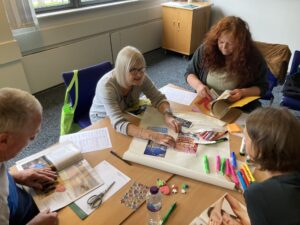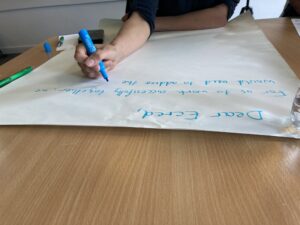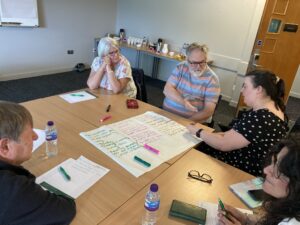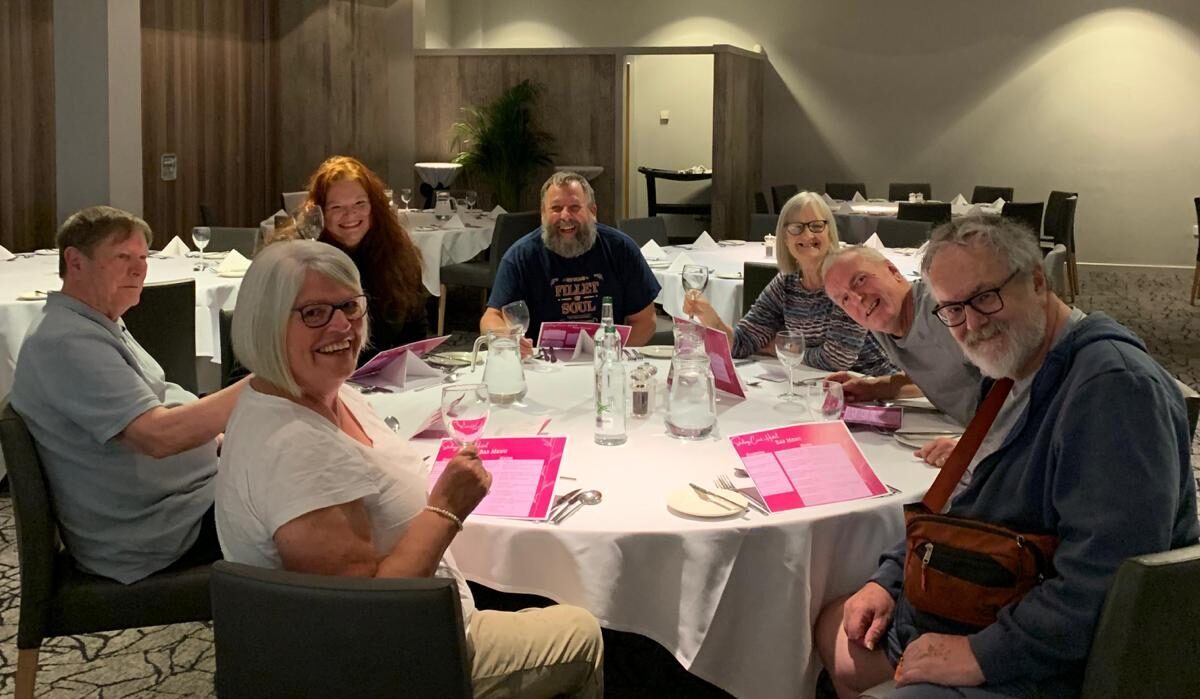On Wednesday 9th August, ECRED and the ECREDibles met for an away day of creativity and visioning in Stirling!
The ECREDibles are a peer support group of people living with dementia who are interested in research. ECRED have been collaborating with the group on co-designing research and working to explore different models to optimise coproduced research approaches. Thanks to a small grant from The BINKS Hub, we have been hosting a series of workshop to scope out how ECRED and the ECREDibles can best collaborate going forward. This day in Stirling was structured around two activities: 1) creatively visioning how we see our future together, and 2) exploring the practicalities, opportunities and challenges of coproducing research within academic structures.
Creative visioning
 Dr Frankie Greenwood (ECRED) introduced a collage activity to encourage members of the ECREDibles to ‘dream big’ with regards to how they see the future of ECRED and the ECREDibles working together.
Dr Frankie Greenwood (ECRED) introduced a collage activity to encourage members of the ECREDibles to ‘dream big’ with regards to how they see the future of ECRED and the ECREDibles working together.
The first group used patchwork to represent the world of people living with dementia who are all different. This patchwork then fed into a picture of cogs and a bike (as “the machine”), with coffee & cake as the essential ingredients of coproduction. This machine was then explored as creating the working world of academia, made up of teamwork and the winding road of collaboration. Here there were pictures of reflection (represented via a yoga picture), letters saying ‘being seen’, and wise owls (to represent the knowledge that people living with dementia bring). On the ‘other side’ of the machine were the words ‘success’.
The second group started their collage with a pathway where researchers and the ECREDibles talk through ideas (represented by the words ‘teamwork makes dreamwork’). These collaborations become a ‘force for change’ and lead into a layered cake (a picture used to represent the different layers of research and working together). The word ‘funding’, ‘we want to learn’ and ‘enlighten yourself’ were also used to portray parts of the collaborative experience. The group also expressed the importance of working in partnership with other universities and not reinventing the wheel. A ‘tinder of dementia’ was suggested whereby lived experience researchers are ‘matched’ with academic researchers through a profile system where each person can learn about other people’s expertise and interests to build teams. There were reflections around pre-project involvement e.g., involvement in funding applications.
Exploring practicalities
In response to a presentation on the challenges that universities face when conducting coproduced research (e.g., short-term funding models, precarious job contracts), the ECREDibles were tasked with writing a letter to ECRED to explain what is needed and why to support future collaborative working.
 Group 1’s letter:
Group 1’s letter:
Dear ECRED,
For us to work successfully together, we would need to address the following:
- The academics need to be less shackled by bureaucracy. There’s a need to articulate the problems and raise awareness of the challenges to make collective change in systems.
- Need to build in longer time in projects to allow for a sustainable future, and keep the same research teams for relationship-building and empathy.
- Raising awareness of the value of keeping the same research teams and build on experience.
- We need support with travel.
- Academic language needs to be more accessible e.g., less jargon.
- Are research, academic articles of value?
- There needs to be more funding and time at the end of projects for dissemination, outputs, impact, and work that is meaningful for us.
- We need to think more clearly about: do we always need more research? Why is knowledge not making a difference in practice?
- We should not be reinventing the wheel but pushing for change: moving from classic research to action research.
- We need to see change.
Group 2’s letter
Dear ECRED,
We would like to work with you in the following ways:
- Develop meaningful research
- Sharing ideas
- More co-research/user-led research by people with dementia
- Create outputs that challenge understandings of dementia
We would like this because:
- We want to see more evidence on the experiences of people with dementia
- Helps to keep our brains active and social inclusion
- Benefits our health and wellbeing
- We are still people who have value and things to contribute that will change how you see dementia
- Take us seriously
- We know that not everyone understands and we need to educate them
This is what we need to happen:
- More meetings / group work sparks ideas
- More money
- Flexible expectations
- Appropriate support to access library/evidence/diary plans etc.
- Regular projects/outputs – meaningful change
- Knowledge exchange/accessible content
- Cake!
Other reflections from the day
 The ECREDibles want to be seen as a flexible group that can challenge the inflexible hierarchies of academic systems. It was also expressed that there is a need to change engrained attitudes and change traditional academic “language”, which is not accessible. They also feel that one of the challenges of coproduced research is that funding is primarily given to pharmacological research (which they recognise is also very important), but that there is a need for more funding for coproduced social research (which is also a form of “treatment”).
The ECREDibles want to be seen as a flexible group that can challenge the inflexible hierarchies of academic systems. It was also expressed that there is a need to change engrained attitudes and change traditional academic “language”, which is not accessible. They also feel that one of the challenges of coproduced research is that funding is primarily given to pharmacological research (which they recognise is also very important), but that there is a need for more funding for coproduced social research (which is also a form of “treatment”).
There was also a discussion about the need for research to explore the impact of coproduction on people living with dementia and whether or not it slows cognitive decline. This exploration could also explore the importance of cognitive reserve as we age. People shared that coproduction “helps keep me alive” and “takes me back to being me”, and that without it they feel they would lack a sense of what do to in life. There was a strong emphasis on being involved as a researcher bringing health benefits and several of the participants said that their own neurologists felt that their involvement had slowed the impact of dementia. This was identified as a priority topic for future research to explore further.
The day ended with everyone sharing a word to sum up their experiences of the day:
Energising, positive, stimulating, filling, fab, and overwhelmed by information (in a good way!)
Thank you to The BINKS Hub for supporting this development work.


